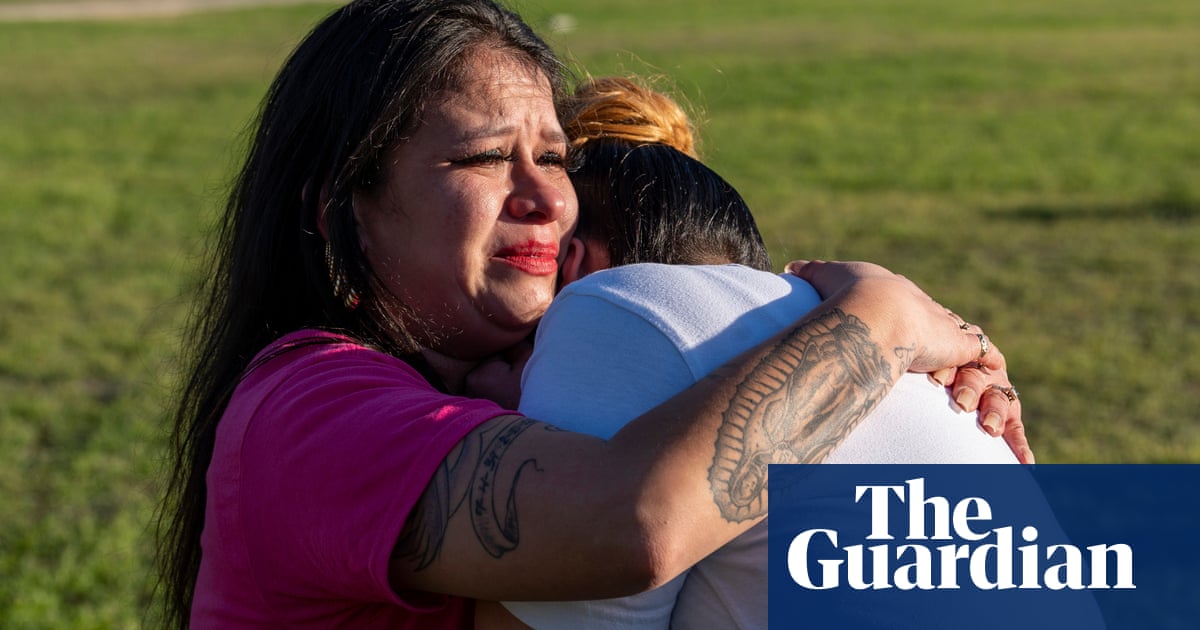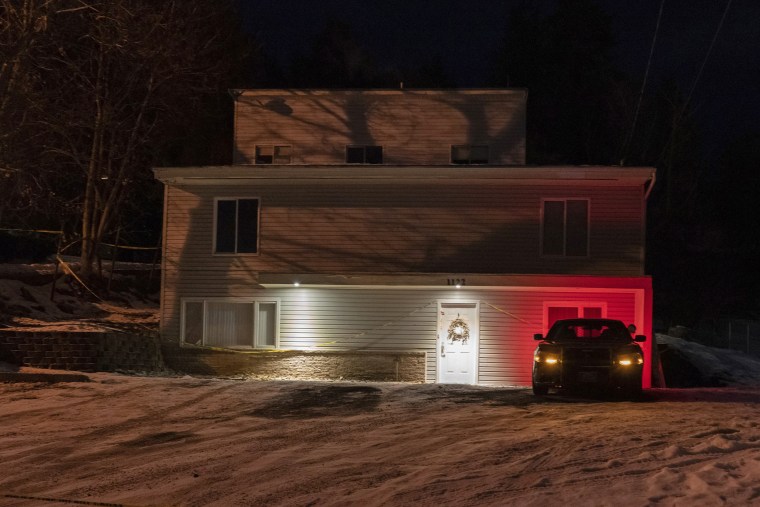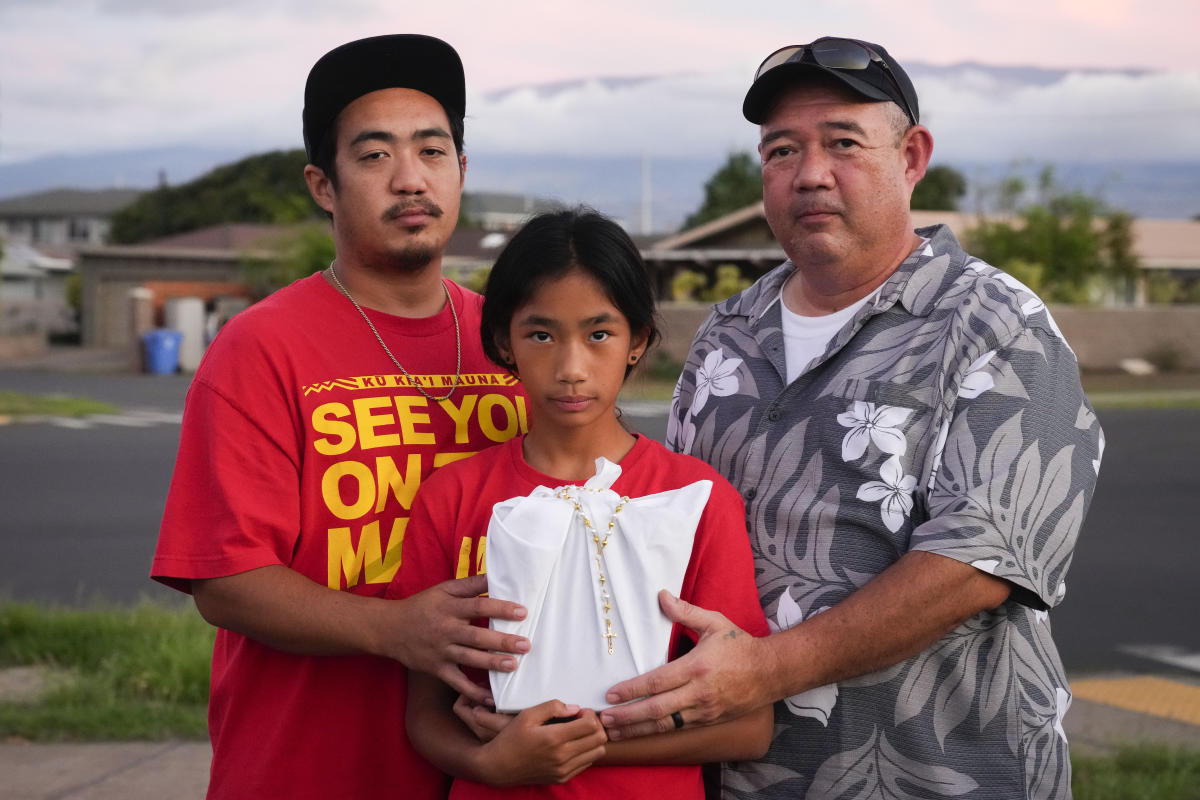LAHAINA, Hawaii (AP) — Sharlene Rabang and her calico cat fled the wildfire that destroyed her town on Maui and arrived at a family home on another Hawaii island after a 24-hour odyssey that included sleeping in a car.
Dazed, coughing and weak, the frail but feisty 78-year-old headed straight for the bedroom. Her daughter headed for a drugstore, thinking the coughing might be asthma or the flu.
It wasn't.
Rabang died with her daughter holding her hand nearly a month later. She had a history of cancer, COVID and high blood pressure, and the doctor initially neglected to attribute her death to the wildfire. It wasn't until November that, at the urging of her family, Honolulu's medical examiner said a contributing cause of death was the thick, black smoke that Rabang breathed as she fled.
The report made Rabang the 100th victim of the deadliest U.S. wildfire in more than a century. The Aug. 8 fire devastated the onetime capital of the former kingdom of Hawaii. It wiped out an estimated 3,000 homes and apartments in Lahaina as it raced through dry, invasive grasses, driven by winds from a hurricane passing far to the south.
The number of people exposed to natural hazards has increased as climate change has intensified disasters like wildfires and hurricanes. Studies suggest that wildfire disproportionately affects vulnerable people such as those who are older, have a diminished capacity to respond to danger, or are low-income.
Of those killed by the Maui fire, 60 were 65 or older.
Many relatives are facing grief and anger and feeling robbed of their final years with their elders. The pain is particularly acute around the holidays.
“I don’t care how many surgeries she’s had in her life, I don’t care that she was vulnerable,” said Rabang’s daughter, Lorine Lopes. “She wouldn’t be dead if it wasn’t because of the fire.”
In September, a team of wildfire researchers in the U.S. West found that in the past decade, the number of highly vulnerable people living within the perimeter of wildfires in Washington, Oregon and California more than tripled from the decade before, to more than 43,000. When a wildfire destroyed the town of Paradise, California, in 2018, 68 of the 85 victims were 65 or older, and more than a dozen had physical or mental impairments that impeded their ability to evacuate.
Recordings of 911 calls from the Maui wildfire underscored how susceptible older residents were.
One woman called about an 88-year-old man left behind in a house: “He would literally have to be carried out,” she told the dispatcher. A man reported that his elderly parents called him after their home caught fire: “They just called to say, ‘I love you, we’re not going to make it.'”
Several victims were residents of a 35-unit low-income senior apartment complex that burned. The nonprofit that ran it, Hale Mahaolu, stressed that its tenants lived independently, but some relatives said more should have been done to evacute them.
Louise Abihai, 97, was among the tenants who died. Strong and sharp, she walked a mile daily and enjoyed the friends she had there.
Her great-granddaughter Kailani Amine wondered if the values of caring for and respecting “kupuna,” the Hawaiian term for elders, were lost in the chaos.
“It’s just sad that they really didn’t have a chance,” Amine said.
Much can be done to reduce risk, such as asking communities what help they need, planning the transportation that may be required in an evacuation, and determining how to communicate with vulnerable people.
“Putting the resources and political will and the social will to assist those populations -- there’s capacity to do that,” said Erica Fleishman, the director of the Oregon Climate Change Research Institute and a co-author of the study about wildfire risk in the West. “We know this is going to keep happening.”
Rabang, who stood barely 5 feet (1.5 meters) tall and weighed under 100 pounds (45 kg), was home alone when the fire struck. Her husband, Weslee Chinen, was with family on Oahu, a short flight away. The couple tended to ignore evacuation warnings for fires and tsunamis — disaster had spared their home before and they expected it would again, Chinen said.
But this time, Rabang's son, Brandon, showed up after driving past a police barricade and insisted she leave. They could feel the heat of the fire on their faces and inhaled intense smoke that turned the sky to darkness.
They made it to a relative's home. There were dogs inside, so Rabang slept in the car with Poke — the calico she adopted after deciding she wanted the oldest, ugliest cat in the shelter, her daughter said.
“She felt old and decrepit, and she wanted a cat that was the same,” Lopes said. “She wanted to give a home to an animal that no one else would.”
The next morning, Rabang was gagging and struggling for breath. She seemed exhausted and heartbroken, and fretted about what her grandchildren would do with the town demolished. It took Lopes and her sister all morning to persuade her to fly to Oahu, where she could be with her husband and daughters.
By 8 p.m., her husband called an ambulance.
Rabang spent nine days in intensive care being treated for respiratory failure, anemia caused by bleeding ulcers and other conditions. She often forgot why she was in the hospital. Her hands were tied to the bed to keep her from trying to rip off her oxygen mask.
When she had recovered enough to leave the ICU, her family struggled to get her to eat, even when they made her her favorite dumpling soup or brought her fresh sashimi.
So after five days at home, an ambulance once again delivered her to the hospital. Her eyes were glazed. Her weight dropped to below 70 pounds (31.8 kg). Her son and his family flew in from Maui. Lopes and her sister took turns holding vigil. Rabang's husband stopped by but found it too upsetting to stay long.
When doctors increased her dose of adrenaline, she went into cardiac arrest. The family ended her life support and she died Sept. 4. Her cat now lives at her husband's family home.
Rabang, who had worked in the restaurant industry, helping turn around failing establishments, had several health conditions that made her vulnerable. She had rheumatoid arthritis, survived pancreatic cancer over a decade earlier, had a kidney removed due to carcinoma in July, and had weakened lungs from COVID.
She was also tough and more than a bit stubborn. She refused to use a wheelchair during cancer recovery and would crawl to the bathroom when her joint pain was too severe to walk.
The doctor who signed her death certificate failed to mention the fire as a cause — an omission that had financial ramifications for the family, as well as emotional ones. For Rabang's husband to receive government help for funeral or other expenses, Lopes said, they needed to prove she was a fire victim.
After phone calls and emails with various agencies, the family persuaded the medical examiner’s office to review her death.
Rabang had already been cremated, but the medical examiner, Dr. Masahiko Kobayashi, considered her records and the family's account, confirming in mid-November that while the main causes were pneumonia and anemia, a contributing factor was smoke inhalation, according to the report, obtained by The Associated Press through a public records request.
Lopes said that when Rabang was added to the victims list, she just started crying. After months of stress, she could finally grieve.
“It was a battle to get her on that list, and now that it happened, I’m just releasing,” Lopes said, sobbing. “I watched her through every torturous moment she went through, fighting for her life. She had to get on that list, because she was part of that event."
___
Johnson reported from Seattle, Kelleher from Honolulu and Thiessen from Anchorage, Alaska. Audrey McAvoy in Honolulu contributed.
Adblock test (Why?)
from U.S. - Latest - Google News https://ift.tt/ZnYLi3v
via
IFTTT













